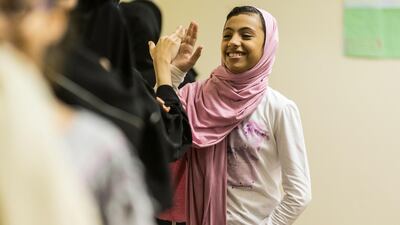School is out for the summer, but that is not stopping Khaled Sayed from attending daily classes at a local university to brush up on his English skills.
“I know and I understand a lot of English words, but when I try to speak, I have a little bit problems with it, so I wanted to develop my speaking as well,” said Khaled.
The 17-year-old is among 1,400 Emirati pupils who have signed up for the Summer Challenge, a three-week academic programme sponsored by the Abu Dhabi Education Council that gives pupils the chance to enrol in English, English testing preparation, entrepreneurship, leadership or computer classes. The courses are delivered at Abu Dhabi University and the United Arab Emirates University and are mostly taught by professors, said Khalifa Al Neyadi, the programme’s supervisor.
“We want students to get familiar with the environment in the university,” said Mr Al Neyadi. “It is a way of encouraging and motivating them to think about higher education.”
Interest has been so high, Mr Al Neyadi said he was forced to turn away pupils, as the classes quickly filled to capacity. Even adults inquired about the courses for themselves, he said, but registration was limited to pupils ages 13 to 17 years. The IELTS preparation and English comprehension classes have been the most popular among pupils, he said.
“The Abu Dhabi Plan is looking for students with high level of English and business skills,” said Mr Al Neyadi. “We want to arm our students, to equip them with the skills necessary for this economic vision in 2030. The student must be good in business and English and computer so he can build the nation.”
The Abu Dhabi Plan calls for 90 per cent of students being capable of enroling in higher education institutions without undergoing a foundation year. But in order to be accepted into most public universities, UAE nationals need to score a minimum of five on the International English Language Testing System (IELTS). In 2015, the mean band score for female IELTS academic test takers from 40 countries measured was 6.0 and 5.8 for males. In the UAE, the average IELTS score was 4.9. IELTS is assessed on a 9-band scale.
Most public schools in the UAE don’t have IELTS preparation classes, said Janet Roberts, senior education consultant with the Knowledge Group, which developed the Adec-approved summer curriculum being delivered at ADU.
“We developed custom resources to cover all the areas -- reading, writing, speaking and listening,” said Ms Roberts. The summer classes were designed break away from traditional teacher-centric learning.
In the IELTS preparation class, for example, pupils sit in groups of four to practice their English speaking and listening skills though a game called timed round robin. Each pupil is given 30 seconds to speak to their group about a predetermined topic. If the student runs out of things to say, his group peppers him with questions about his topic.
“They’re more inclined to talk to their peers than their teachers anyway,” said Ms Roberts. “For many of them, they’ve never been in a classroom where the interaction is with each other.
At the end of the exercise, high-fives and fist-bumps are exchanged.
Ms Roberts said the summer challenge classes offer pupils “an added boost.”
“I consider it a direct answer to Adec’s mandate, ‘We want the students to be highly engaged, actively involved in their learning,’” said Ms Roberts.
Sonia Elhaj, who teaches entrepreneurship in the Summer Challenge, said it doesn't operate like a "traditional" school.
“It looks like a classroom, but it’s different. The students get to create things, they get to meet new people, to interact with new people in new ways,” said Ms Elhaj.
The students are not graded on their performance – there is no pass or fail. But, in the entrepreneur class, for instance, they compete in teams to develop the best business idea.
“It’s completely different from school,” said Ms Elhaj. “School is about getting things perfectly right, having the maximum grade, having it always be 100 per cent and all of that. And that is good in ways, you learn from that, but you don’t necessarily empower yourself to take a risk. We celebrate failure. Failing means that you’re trying. If you’re not failing, you’re not taking a risk.”
For Khaled, a soft-spoken Emirati who aspires to work as a math teacher in the future, the interactive group work has already had a positive effect.
“Before I was, like, shy, but now I can speak,” he said.
rpennington@thenational.ae

